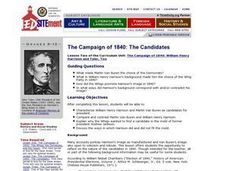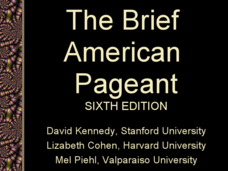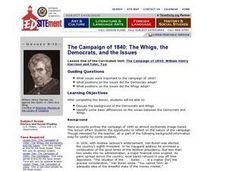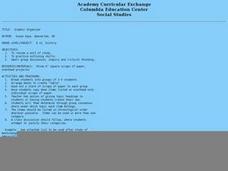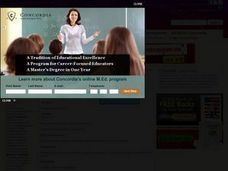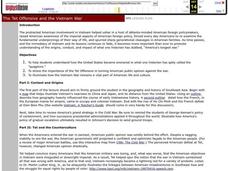Curated OER
Inform Your Vote
Students examine and participate in the election process, analyze current event topics and offer their opinions. They then share their viewpoints on civic issues. They are encouraged to do additional research on the election's hot issues.
Curated OER
NONVOTING: CHAPTER 6: SECTION 4: WORKSHEET
It is interesting to look at the election and voting process from a far. This activity does just that, your class will look at trends in voting populations and develop an understanding of the voting process. Please note this resource...
Curated OER
The Brief American Pageant: The Eisenhower Era
Starting with the election results of Eisenhower over Stevenson in 1952, this presentation features additional maps about the elections of 1956 and 1960, with electoral votes by state. Additional slides detail the Far East (Vietnam,...
Curated OER
We the People: A Study in American Voter Turnout: US Government
Learners examine and compare voter turnout in US Elections. They write a letter to a favorite candidate or representative suggesting ways to increase voter turnout.
Curated OER
The Campaign of 1840: The Campaign
Learners discuss the use of visual images, objects, and spectacle in the 1840 campaign, then take a stand: Was the campaign of 1840 based more on substance or image?
Curated OER
The Campaign of 1840: The Candidates
Students compare and contrast William Henry Harrison and Martin Van Buren as candidates for president. They explain why the Whigs wanted to find a candidate in the mold of former president Andrew Jackson and discuss whether Harrison fit...
Curated OER
The Election Is in the House: Was There a Corrupt Bargain?
Students take a stand, supported by evidence, on whether there was a "corrupt bargain" between Henry Clay and John Quincy Adams.
Curated OER
Indian Removal
Students discuss how the various acts used to force Native Americans from their home. Using the Internet, they compare and contrast the policies toward the Native Americans by presidents through Jackson. They evaluate the impact of...
Curated OER
The Brief American Pageant: Drifting Toward Disunion
A series of maps take viewers through the Antebellum period in American history. Focusing on the elections of Buchanan and Lincoln, as well as the Southern opposition to secession, the slideshow would make a good companion to a lecture...
Curated OER
The Brief American Pageant: The Politics of Boom and Bust
Prior to 1929, the Roaring Twenties were a great time to be alive and to spend money. These slides would be a good transition into a unit on the Great Depression. It presents five images about the political and financial context of the...
Curated OER
The Monroe Doctrine: President Monroe and the Independence Movement in South America
Students identify conditions in Europe that relate to the independence movements in South America and list reasons why President Monroe gave for recognizing the independence movement in South America.
Curated OER
The Campaign of 1840: The Whigs, the Democrats, and the Issues
Students reflect on the nature of the campaign of 1840. They identify the positions of the Democrats and the Whigs and their basic differences.
Curated OER
Graphic Organizing: Early American History
In collaborative groups, young US historians sort cards (each labeled with a single early American event or issue) according to which of the first four presidents was leading the country at the time. Learners copy the events onto a...
Curated OER
Who Gets the Job?
Students explore the process for presedential Cabinet appointments. They determine common characteristics found in members of the Cabinet.
Curated OER
The Executive Branch
Students study the federal government, which is divided into 3 branches. They have a minimal understanding of the responsibilities of each branch.
Curated OER
Into a New Millennium, Lesson 4: 1970 to Present
Students view different slides on how agriculture has changed in America. In groups, they are given one resource to read and answer discussion quesions. After reviewing answers, they participate in different scenerios to help protect...
Curated OER
Young Voters Make A Difference
Students research recent statistics on voting by those 18 to 24. They survey senior students to determine their intent to vote in the next election. Students display the data in charts and graphs. They write the results and share it with...
Curated OER
Early Voting, Other Election Changes are Possible
Students use the internet and linked sites to explore current voting methods in their community. They research suggestions that have been made for changes and interview people who made these suggestions (when possible). Students suggest...
Curated OER
Youth voters and election turnout
Students investigate why 18- to 24- year-olds have a low turnout at the polls. Students develop a plan to encourage young Americans to vote, or write a persuasive essay telling why they should vote.
Curated OER
Your Vote Counts!
Students build an election campaign around their favorite TV characters. They acquire knowledge about candidates, slogans, qualifications, and voting using the activities in this instructional activity. Thus, they simulate the election...
Curated OER
Special Interests: How Would A Legislator Vote?
Students act as elected officials who must make decisions that will make someone unhappy. They consider five bills that are up for vote in light of the contributions that many special-interest groups made to their campaigns. Students...
Curated OER
The Tet Offensive and the Vietnam War
High schoolers discover how the United States became involved in the Vietnam War, the importance of the Tet Offensive in turning American public opinion against the war, and how the Vietnam War is still a part of American life and culture.
Curated OER
What Does George W. Bush Have in Common With Past U.S. Presidents?
Sixth graders discover what it takes to become President of the United States. Using a database, they complete a scavenger hunt to determine what George W. Bush has in common with past Presidents. They also create a spreadsheet which...
Curated OER
Animal Issues: Let's Talk Turkey
Thanksgiving means an untimely demise for thousands of turkeys every year. This turkey Q and A provides nine questions bringing facts and statistics of turkey consumption to the discussion table. There is an answer key that provides full...
Other popular searches
- Presidential Inauguration
- Presidential Elections
- Presidential Protection
- Presidential Duties
- Presidential Cabinet
- 2000 Presidential Election
- 2008 Presidential Elections
- Presidential Election Voting
- Presidential Biographies
- Presidential Debate
- Presidential Powers
- Presidential Campaigns







